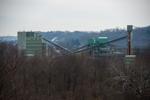WAYNESBURG – Greene County goes bankrupt.
Although the natural gas industry has received millions in payouts to compensate counties such as Greene that are operating natural gas wells, it is struggling to balance its budget of more than $ 40 million. This year, in the wake of a pandemic, the commissioners raised property taxes for the first time since 2010.
With no major changes, projections by the county treasury show Greene may not have the revenue or reserves to cover his costs through 2023.
It's a financial situation that seemed all but guaranteed, as coal mining has all but disappeared here, undermining the backbone of the local economy. That was until the natural gas boom – and the massive inflow of money that came with it – offered another route.
The gust of wind seemed to buy Greene County time to figure out how it would survive without coal.
But nearly 10 years and more than 1,000 natural gas wells later, the county does not seem to be doing any better financially than it did when it began after spending $ 37.2 million in impact fees without spending any money planning the day the Work would inevitably slow down.
"I quickly realized there was no financial planning," said Mike Belding, one of two new county commissioners on the three-seat governing body. "They were just spending money when it came in."
Greene, home to 36,000 people, is one of 31 counties across the state receiving Impact Fee payouts through a state program initiated in 2012 called Act 13. The funds are distributed annually and the payouts are based on factors such as the number of wells in an area and population.
Only three other counties – Bradford, Susquehanna, and Washington – have received more cash than Greene from impact fees over the life of the program, according to reports filed with the Pennsylvania Public Utility Commission.
Unlike others who put the money aside and saved it for future investments, budget reports show that Greene has used approximately $ 17.5 million to balance his budget since 2015. The other half went to projects that the newest commissioners said were short-sighted and wasteful, like hiring a $ 400,000 comprehensive plan that was never drawn and a $ 550,000 business loan program, that made no return for the county.
Greene County Commissioner Mike Belding gives a tour of Greene County which is nearly broke after years of what he calls poor financial management.
Belding and the other new District Commissioner, Betsy McClure, both Republicans, have promised to stop using the impact fees to balance the budget each year. To date, they have allocated around $ 4.5 million for future projects such as road repair, recreational area development, and broadband internet expansion.
It wasn't easy, said Belding. Not relying on impact fees meant finding other ways to fill a $ 5 million hole in the 2021 budget.
"We tried every other opportunity and cut all of those costs," said Belding. "We just couldn't get there. So we made the tough decision to raise taxes."
Bust, boom, bust
The decline of the coal industry is inevitable here. Just outside of Waynesburg, the center of the district government, the Emerald Mine is idle. It's one of nine that were operational in 2011, according to records from the State Department of Environmental Protection.
By 2015, Emerald Mine closed its 38-year-old business citing depleted reserves, a slowing market and a challenging regulatory environment. About 300 people lost their jobs, and the mine’s green towers and endless rails are a constant reminder.
By 2019, the number of active mining sites dropped from nine to four, and the county's population shrank by about 2,500 people.
"We are playing catch-up from decades ago," said Commissioner Blair Zimmerman, a Democrat who has served on the board since 2012 and worked on the surface of the Cumberland Mine for more than 40 years. He was previously Mayor of Waynesburg.
Towering remains of the abandoned coal mine known as the Emerald Mine can be seen on the outskirts of Waynesburg in Greene County.
He and the other two commissioners said the county should have started planning the transition from reliance on coal a long time ago and now it is paying the price for that inaction.
In 2012, Republican Governor Tom Corbett signed Law 13, which revised the regulations governing the state's gas and oil industry.
Greene County received $ 3 million in compensation for the first year of the program. At the same time, contract workers hired by gas companies to build hundreds of new wells have increased demand for rental properties, Belding said. Properties rented for around $ 500 to $ 600 a month cost more than $ 1,200, and new hotels were built to accommodate the workforce.
Local businesses and restaurants took off, and about 10 years ago a Walmart joined the ranks of fast food restaurants and gas station chains just off the freeway.
The county has hosted 1,257 natural gas wells and averaged $ 4.1 million in impact fee payments annually as of 2019, the last year for which data is available.
"It's a godsend," said Belding. "It's like winning the lottery a bit. Cash inflow from something unexpected."
However, as the gas industry slowed, so did the number of workers outside the city who spent on hotels and the local economy. Energy companies are drilling fewer new natural gas wells, so Law 13 payments are also expected to decrease.
The district also expects at least two more mining operations to cease in the next two years.
Other rural counties in Pennsylvania are facing similar challenges, said Lisa Schaefer, executive director of the County Commissioners Association of Pennsylvania, which supports county governments across the state.
Of the 13 new businesses that held ribbon cutting ceremonies with Greene County in 2019, 12 replaced previously filled storefronts.
Many have small business tax bases, but large areas of protected state land such as wilderness areas, parks, and forests that are not taxed. Shrinking populations mean fewer people are left to share the property tax burden. Those who are left are usually older residents who are already unemployed.
About 18% of Greene County's 36,000 residents are over 65 years of age and 19% are under 18 years of age.
Counties need to make money so they can provide services such as mental health support, drug and alcohol programs, and child and youth services – programs that have seen tens of millions of dollars in cuts at state and federal levels in recent years.
"So if the support from these levels continues to decline, it will be more and more difficult for the districts to make up for the difference, especially if they only have property taxes to turn to," said Schäfer.
Neglect reserves
The counties have a wide discretion in the use of impact fees. However, you must report the details to the Pennsylvania Public Utility Commission. These reports are public online.
Records show that Greene assigned millions of categories such as public infrastructure building, social services, and public safety, but they don't show exactly how they were spread. There has been no spending on planning initiatives, tax cuts, water conservation, or career and technical centers in the past nine years.
In contrast, Bradford County said it deposited approximately $ 23.8 million of its Act 13 payments into its capital reserve fund. Washington, Greene's more populous neighbor to the north, has allocated $ 37.1 million in reserves, records show. But Greene County only allocated about $ 1.2 million for the capital reserve.
"Years ago it was difficult to have a district leadership pretending coal was moving at the pace it was," said Veronica Coptis, a Greene County-born executive director of the Center for Coalfield Justice. Washington County-based non-profit advocating for communities that use fossil fuels.
She has been dealing with questions of economic development in the region for seven years.
"It is definitely a turning point when elected officials recognize the reality of our economic crisis," said Coptis.
Residents often tell her that their communities need investment in basic infrastructure. This includes dealing with problems such as epidemics or repairing streets and sidewalks, she said.
"You have to be able to trust your water," she added. "Your schools must be good."
"It's pathetic"
58-year-old Bob Morris opened Burgers and More – a walk-in sandwich shop that serves beef from his own farm – on State Route 21 in Waynesburg about a year and a half ago.
He expected that most of his customers would be truckers hauling fuel and equipment for local drilling operations. Instead, most local residents are looking for alternatives to fast food chains – the only companies that appear to be able to survive, Morris said.
His niece, Kelli Bosworth, helps run the kitchen. Even on a chilly late winter Friday, there's a steady rush for lunch, and Bosworth juggles answering the phone and taking walk-up orders.
Bob Morris, Center, owner of Burgers & More, takes a customer order while working with his brother Scott Morris [right] at the family burger business in Waynesburg. Morris said he has plans to expand his business over the summer to serve ice cream to locals as well.
As a 34-year-old mother of four, Bosworth wants more opportunities for her children – safe places like parks or pools to play in, internet access, and education.
According to census data, around 20% of households in the district had internet access in 2018. Last spring, the district estimates that around 40% of the district's 4,652 elementary and high school students had no access to online courses when schools closed at the beginning of the pandemic.
It's an improvement that longtime Greene business owner Johnny Humble believes will be crucial if the county is to attract and retain new businesses and residents. Of the 13 new companies that held ribbon cutting ceremonies with the county in 2019, 12 replaced previously-filled storefronts, Belding said.
Humble has run its business for 47 years, first with his father, then alone as the Humble Carpet and Decorating Center for the past 25 years. He still lays floors with his son every day.
Although many of his customers are on-site, having a website and social media presence was critical to the survival and growth of his business even before the coronavirus pandemic broke out and he was forced to limit face-to-face meetings with prospects, Humble said.
"For God's sake, we're living in 2021," said Humble. "It's pathetic."
WHILE YOU ARE HERE … When you've learned something from this story, keep paying and join Spotlight PA so that someone else can do it in the future at spotlightpa.org/donate. Spotlight PA is funded by foundations and readers like you who are committed to accountability journalism that gets results.



